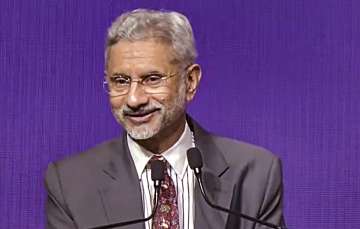External Affairs Minister Dr S Jaishankar on Sunday said that relations between India and Canada are going through a "difficult phase" as India has problems with "certain segments of Canadian politics". He said that the issuance of visas will be resumed if there is any progress in the safety of Indian diplomats in Ottawa.
Addressing the Kautilya Economic Conclave, Jaishankar highlighted that diplomatic parity was sought by India over concerns about interference by Canadian personnel in Indian affairs.
"Parity is very much provided for by the Vienna Convention, which is the relevant international rule on this. In our case, we invoked parity because we had concerns about continuous interference in our affairs by Canadian personnel," he said.
"If we see progress in safety of our diplomats in Canada, we would like to resume issuance of visas there," the external affairs minister added, replying to a question on India-Canada ties. This comes in the midst of a diplomatic standoff between India and Canada following Canadian Prime Minister Justin Trudeau's allegations of Indian involvement in the killing of Khalistani terrorist Hardeep Singh Nijjar.
Canada recently announced the withdrawal of 41 of its diplomats from India. Canadian Foreign Minister Melanie Joly described New Delhi's action as "contrary to international law," and in violation of the Vienna Convention on diplomatic relations. India had rejected the allegation.
Meanwhile, the Ministry of External Affairs (MEA) said that it is reviewing the security situation that led to the suspension of visa services, according to sources.
Jaishankar on Israel-Hamas war and other conflicts
Speaking on the ongoing war between Israel and Hamas, among other conflicts, the EAM asserted that no danger is "too distant" and that such conflicts have emerged as a key contributor to global volatility with consequences visible beyond the immediate geography.
"In the domain of violence, there is also a less formal version of terrorism which has long been honed and practised as a tool of statecraft. The biggest takeaway for all of us is that any expectation that conflicts and terrorism can be contained in their impact is no longer tellable. No danger is too distant anymore," he said at the event.
Jaishankar also mentioned the Ukraine conflict and said that the prevailing situation in the Middle East is "not entirely clear" since the Hamas attack on Israel two weeks ago. He also remarked that the most powerful nations are comparatively not as powerful as they used to be in the past and middle powers have started to come into their own
India's position far better than before: EAM
Jaishankar further stressed that India is in a far better position than two to five decades before. "Every set of solutions throws up a new generation of problems. We constantly dissect, analyze, debate, and sometimes even agonise," he said.
Jaishankar further stressed on direct disruptive impact of climate change on the international economy, as well as the concerns of the global economy and said that the unipolar world is a "distant history".
"The bipolar world was even more distant in the bipolarity of the US-Soviet Union. And I don't think US, China will really end up bipolar. I think there are too many next-run powers with sufficient clout and autonomous activity and regions of their own dominance and privacy for that to happen... To my mind, a lot of our analysis has to overcome the burden of past constructs...the reality is yes at one level, we are far more globalised," he added.
(with agency inputs)
ALSO READ | India making life 'unbelievably difficult' for millions of people, alleges Canada PM Justin Trudeau
ALSO READ | Canada: Trudeau booed at Toronto mosque as pressure mounts over Israel-Hamas war | WATCH
Latest India News
